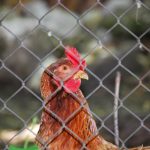Chickens, like many other animals, are sensitive to changes in temperature. When the weather turns cold, chickens will naturally try to keep warm by fluffing up their feathers and huddling together. They may also reduce their activity levels in an effort to conserve energy. In extreme cold, chickens may even experience frostbite on their combs and wattles. It’s important for chicken owners to understand how their birds react to low temperatures so they can take appropriate measures to keep them safe and comfortable during the winter months.
In addition to physical reactions, chickens also experience changes in their behavior when the weather gets cold. They may spend more time in their coop, seeking shelter from the wind and snow. They may also be less inclined to lay eggs during the winter months, as their bodies prioritize staying warm over reproductive functions. Understanding these natural responses to cold weather can help chicken owners make informed decisions about how to care for their birds during the winter.
Table of Contents
- 1 Coop Design: Creating a Warm and Insulated Environment for Your Chickens
- 2 Heating Options: Safe and Effective Methods for Keeping Chickens Warm
- 3 Feeding and Nutrition: Essential Nutrients to Help Chickens Stay Warm
- 4 Water Management: Preventing Freezing and Keeping Chickens Hydrated
- 5 Winter Health: Recognizing and Preventing Cold-Related Illnesses in Chickens
- 6 Behavioral Strategies: Encouraging Chickens to Stay Warm and Active in Cold Weather
Coop Design: Creating a Warm and Insulated Environment for Your Chickens
One of the most important factors in keeping chickens warm during the winter is providing them with a well-designed coop. The coop should be insulated to help retain heat and protect the birds from cold drafts. It should also be well-ventilated to prevent moisture buildup, which can lead to respiratory issues in chickens. Additionally, the coop should be spacious enough to allow the birds to move around comfortably, but not so large that it becomes difficult to heat effectively.
In addition to insulation and ventilation, the coop should also be equipped with roosts and nesting boxes to provide the chickens with places to perch and lay eggs. The floor of the coop should be covered with a thick layer of bedding, such as straw or wood shavings, to provide insulation and absorb moisture. Finally, the coop should be predator-proof, with secure latches and barriers to keep out unwanted visitors. By creating a warm and insulated environment for their chickens, owners can help ensure that their birds stay healthy and comfortable throughout the winter.
Heating Options: Safe and Effective Methods for Keeping Chickens Warm
When it comes to heating a chicken coop, there are several safe and effective options available to owners. One popular choice is a radiant heat panel, which provides gentle warmth without creating hot spots or posing a fire hazard. Another option is a ceramic heat emitter, which produces heat without emitting light, making it ideal for use at night. Both of these options are safe for use in a coop as long as they are installed properly and monitored regularly.
For owners who prefer not to use electric heating sources, there are also non-electric options available. One common method is to use deep litter bedding, which involves adding layers of organic material to the floor of the coop to generate heat as it decomposes. Another option is to use passive solar heating, by positioning the coop to take advantage of the sun’s warmth during the day. Regardless of the method chosen, it’s important for owners to carefully research and consider the safety and effectiveness of each option before implementing it in their coop.
Feeding and Nutrition: Essential Nutrients to Help Chickens Stay Warm
Proper nutrition is essential for helping chickens stay warm during the winter months. In cold weather, chickens require more energy to maintain their body temperature, so it’s important for owners to provide them with a balanced diet that meets their increased energy needs. This can be achieved by offering a high-quality layer feed that is specifically formulated for cold weather conditions. Layer feed contains essential nutrients such as protein, carbohydrates, vitamins, and minerals that help support overall health and keep chickens warm.
In addition to layer feed, owners can supplement their chickens’ diet with high-energy treats such as cracked corn or black oil sunflower seeds. These treats provide an extra boost of calories that can help chickens stay warm during cold weather. It’s also important to ensure that chickens have access to fresh water at all times, as dehydration can make it more difficult for them to regulate their body temperature. By providing a balanced diet and ensuring access to fresh water, owners can help their chickens stay healthy and warm throughout the winter.
Water Management: Preventing Freezing and Keeping Chickens Hydrated
Water management is a critical aspect of caring for chickens during the winter months. In cold weather, waterers can freeze quickly, leaving chickens without access to hydration. To prevent freezing, owners can use heated waterers or add insulation around non-heated waterers. Heated waterers are designed to keep water at a temperature that prevents freezing, ensuring that chickens have access to water at all times. Insulation can also help slow down the freezing process, giving chickens more time to drink before the water turns into ice.
In addition to preventing freezing, owners should also regularly check waterers for cleanliness and functionality. Dirty or malfunctioning waterers can lead to dehydration or illness in chickens, so it’s important to clean and maintain them regularly. Owners should also consider placing waterers in areas of the coop that receive sunlight during the day, as this can help prevent freezing and keep water at a drinkable temperature. By implementing these water management strategies, owners can ensure that their chickens stay hydrated and healthy throughout the winter.
Cold weather can pose health risks for chickens, so it’s important for owners to be vigilant in recognizing and preventing cold-related illnesses. One common issue in cold weather is respiratory infections, which can be caused by drafts or moisture buildup in the coop. To prevent respiratory issues, owners should ensure that the coop is well-ventilated and free from drafts, and that bedding is kept dry to prevent moisture buildup.
Another potential health concern in cold weather is frostbite, which can affect chickens’ combs, wattles, and feet. To prevent frostbite, owners should provide ample bedding in the coop for insulation and ensure that the birds have access to shelter from wind and snow. Owners should also regularly inspect their birds for signs of frostbite, such as discoloration or swelling, and take appropriate measures if any issues are detected.
In addition to respiratory infections and frostbite, owners should also be mindful of other cold-related illnesses such as hypothermia and dehydration. By monitoring their birds closely and taking proactive measures to prevent illness, owners can help ensure that their chickens stay healthy throughout the winter.
Behavioral Strategies: Encouraging Chickens to Stay Warm and Active in Cold Weather
In addition to physical measures such as insulation and heating, there are also behavioral strategies that owners can use to encourage their chickens to stay warm and active during cold weather. One effective strategy is to provide enrichment activities such as hanging treats or toys in the coop to encourage movement and mental stimulation. This can help keep chickens active and engaged even when they may be less inclined to venture outside in cold weather.
Another behavioral strategy is to encourage socialization among the birds by providing ample space for them to roost together and interact with one another. Chickens naturally huddle together for warmth, so providing them with opportunities for socialization can help them stay warm and comfortable during cold weather. Owners can also consider adding additional roosts or perches in the coop to give chickens more options for staying off the cold ground.
By implementing these behavioral strategies, owners can help ensure that their chickens stay active and healthy throughout the winter months. Encouraging movement and socialization can help keep chickens warm and engaged even when temperatures drop, contributing to their overall well-being during cold weather.
In conclusion, caring for chickens during the winter months requires careful consideration of their natural responses to cold weather, as well as proactive measures to keep them warm and healthy. By understanding how chickens react to low temperatures and creating a warm and insulated environment for them, owners can help ensure that their birds stay comfortable throughout the winter. Additionally, providing proper nutrition, managing water effectively, recognizing and preventing cold-related illnesses, and encouraging behavioral strategies can all contribute to the well-being of chickens during cold weather. With careful planning and attention to detail, owners can help their chickens thrive even in the coldest months of the year.
Meet Walter, the feathered-friend fanatic of Florida! Nestled in the sunshine state, Walter struts through life with his feathered companions, clucking his way to happiness. With a coop that’s fancier than a five-star hotel, he’s the Don Juan of the chicken world. When he’s not teaching his hens to do the cha-cha, you’ll find him in a heated debate with his prized rooster, Sir Clucks-a-Lot. Walter’s poultry passion is no yolk; he’s the sunny-side-up guy you never knew you needed in your flock of friends!







